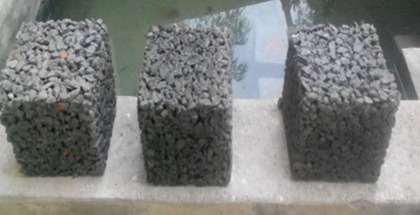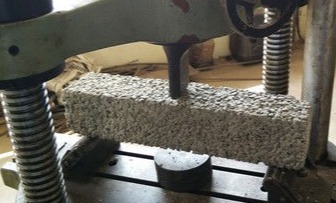PERVIOUS CONCRETE USING SUPPLEMENTARY CEMENTITIOUS MATERIALS
In recent times, there has been a significant focus on providing sustainable and environmentally friendly solutions for concrete construction. The perfect solution for this is Pervious concrete .Pervious concrete is significantly different to that of conventional concrete as it has the ability to allow water to percolate through it large sized pores. This unique ability presents many environmental benefits such as minimizing storm water run-off, recharging groundwater and reducing the heat absorption in the pavement. The investigation considered with the following combinations of cement and supplementary cementitious materials, by weight proportion:
- 100 % Cement (Control Mix)
- 87.5 % Cement, 7.5 % GGBFS and 5 % Silica Fume
- 80 % Cement, 10 % GGBFS and 10 % Silica Fume
- 77.5 % Cement, 15 % GGBFS and 7.5 % Silica Fume
- 70 % Cement, 20 % GGBFS and 10 % Silica Fume
- 60 % Cement, 20 % GGBFS and 20 % Silica Fume

Pervious concrete cubes.

Flexural testing of Pervious concrete.
Considering the necessity to find the ways to improve the strength of pervious concrete, an experimental investigation on pervious concrete was continued as the main objective of this work. The purpose of this study is to investigate the effect of partial replacement of cement with supplementary cementitious materials, GGBFS (Ground Granulated Blast Furnace Slag) and Silica fume, on the mechanical properties and permeability of pervious concrete, having a fixed porosity of about 20%. The following properties of the pervious concrete were studied:
- Density and Porosity
- Compressive strength
- Water permeability
- Flexural Strength
- Tensile Strength
The results showed that some of the mixes with supplementary cementitious materials had improved the compressive strength, decreased the water permeability of pervious concrete with fixed porosity while some combinations have shown to decrease the strength of the pervious concrete. However, the decrease in the strength is not alarming as the pervious concrete systems are generally intended for uses in places where the loading is low. However, for a pervious concrete system its corresponding strength is as important as its permeability characteristics.